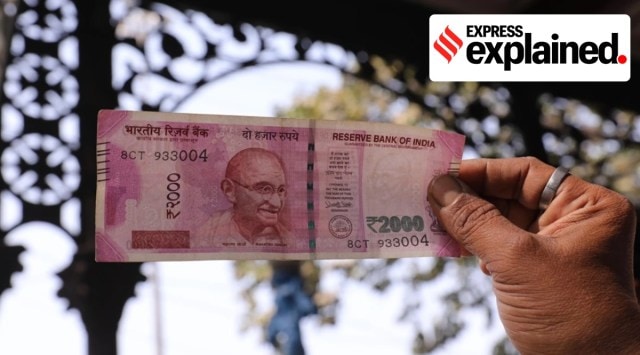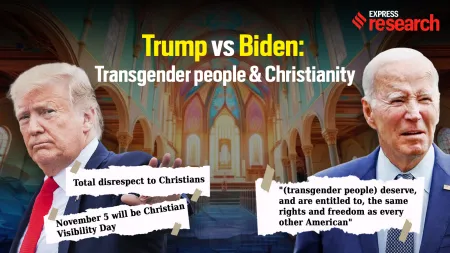- India
- International
Why has the RBI withdrawn Rs 2,000 notes?
You have from May 23 to Sept 30 to deposit these notes in your bank account or exchange them for other denominations. But you can exchange only 10 notes at a time. Why has the RBI done this?
 The Rs 2000 note was introduced in November 2016 under Section 24(1) of The RBI Act, 1934, primarily with the objective of meeting the currency requirement of the economy expeditiously after the legal tender status of Rs 500 and Rs 1000 notes was withdrawn. (File)
The Rs 2000 note was introduced in November 2016 under Section 24(1) of The RBI Act, 1934, primarily with the objective of meeting the currency requirement of the economy expeditiously after the legal tender status of Rs 500 and Rs 1000 notes was withdrawn. (File)
The Reserve Bank of India (RBI) has decided to withdraw the Rs 2000 denomination banknotes from circulation. But existing notes will continue to be legal tender, the RBI announced on Friday.
The central bank has advised the public to deposit Rs 2000 banknotes, which were introduced after Rs 500 and Rs 1000 notes were withdrawn during the demonetisation exercise six years ago, into their bank accounts and /or exchange them into banknotes of other denominations at any bank branch.
Why has the RBI withdrawn Rs 2000 notes?
The Rs 2000 note was introduced in November 2016 under Section 24(1) of The RBI Act, 1934, primarily with the objective of meeting the currency requirement of the economy expeditiously after the legal tender status of Rs 500 and Rs 1000 notes was withdrawn. With the fulfilment of that objective, and once notes of other denominations were available in adequate quantities, the printing of Rs 2000 notes was stopped in 2018-19.
The RBI issued the majority of the Rs 2000 denomination notes prior to March 2017; these notes are now at the end of their estimated lifespan of 4-5 years. This denomination is no longer commonly used for transactions; besides, there is adequate stock of banknotes in other denominations to meet currency requirements.
“In view of the above, and in pursuance of the ‘Clean Note Policy’ of the Reserve Bank of India, it has been decided to withdraw the Rs 2000 denomination banknotes from circulation,” the RBI said.

And what is the Clean Note Policy?
The Clean Note Policy seeks to give the public good-quality currency notes and coins with better security features, while soiled notes are withdrawn out of circulation. The RBI had earlier decided to withdraw from circulation all banknotes issued prior to 2005 as they have fewer security features as compared to banknotes printed after 2005.
However, the notes issued before 2005 continue to be legal tender. They have only been withdrawn from circulation in conformity with the standard international practice of not having notes of multiple series in circulation at the same time.
So will the Rs 2000 banknotes continue to be legal tender?
The Rs 2000 banknote will continue to maintain its legal tender status, the RBI has said. Members of the public can continue to use Rs 2000 banknotes for their transactions and also receive them in payment. “However, they are encouraged to deposit and/ or exchange these banknotes on or before September 30, 2023,” the RBI said.
What will happen after September 30?
The RBI has not clarified the status of these notes after September 30. However, it has said that its instructions on the Rs 2000 notes will be effective until that date.
What should you do with the Rs 2000 notes you have?
The RBI has advised people to “approach bank branches for deposit and/ or exchange” of these banknotes. “The facility for deposit into accounts and exchange for Rs 2000 banknotes will be available at all banks until September 30, 2023,” the RBI has said. The facility for exchange will also be available until September 30 at 19 RBI Regional Offices that have Issue Departments.
Is there a limit on how much money you can exchange or deposit?
You can exchange Rs 2000 banknotes up to a limit of Rs 20,000 at a time. You don’t have to go your own bank — a non-account holder of bank also can exchange Rs 2000 banknotes up to a limit of Rs 20,000 at a time at any bank branch.
The exchange of Rs 2000 banknotes can also be made through business correspondents up to a limit of Rs 4000 per day for an account holder.
Deposits into bank accounts can be made without restrictions “subject to compliance with extant Know Your Customer (KYC) norms and other applicable statutory / regulatory requirements”, the RBI has said.
When can you start exchanging the Rs 2000 notes?
To give time to banks to prepare, RBI has asked people to approach branches or ROs of RBI from May 23 to exchange their notes.
What happens if someone has a very large number of Rs 2000 notes?
Technically, a person can seek multiple exchanges in packets of Rs 20,000 at a time. However, this is expected to attract the attention of enforcement agencies and the Income-tax Department. Those holding large sums of money in Rs 2000 notes are likely to find it difficult to exchange their money.
Could there be a repeat of the demonetisation chaos of 2016?
It is unlikely that bank branches will witness chaos and long queues like in 2016 this time. The printing of Rs 2000 notes was stopped in 2018-19, and they are no longer commonly seen with the public — unlike the ubiquitous Rs 500 and Rs 1000 notes in 2016.
Also, the decision to withdraw Rs 500 and Rs 1000 notes was announced suddenly, taking the public by surprise. The exchange Rs 2000 notes will begin only on May 23, so banks and the public have sufficient time.
So what is the value of Rs 2000 notes in circulation currently?
About 89% of the Rs 2000 denomination banknotes were issued prior to March 2017, and are at the end of their estimated 4-5-year lifespan. The total value of these banknotes in circulation has declined from Rs 6.73 lakh crore at its peak as on March 31, 2018 (37.3% of notes in circulation) to Rs 3.62 lakh crore, constituting only 10.8% of notes in circulation on March 31, 2023.
And what steps are banks supposed to take now?
The RBI has asked all banks to discontinue issuing Rs 2000 denomination banknotes with immediate effect, and to reconfigure ATMs and cash recyclers accordingly.
Banks holding currency chests (CCs) should ensure that no withdrawal of Rs 2000 denomination is allowed from the CCs. All balances held in the CCs should be classified as unfit and kept ready for dispatch to the respective RBI offices.
More Explained
EXPRESS OPINION
May 03: Latest News
- 01
- 02
- 03
- 04
- 05







































